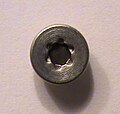Radionuclide
(Redirected from Radioisotopes)
Radionuclide (also known as a radioisotope or radioactive isotope) is an atom that has excess nuclear energy, making it unstable. This excess energy can be used in a number of ways, such as in medical imaging and treatments.
Overview
A radionuclide contains an unstable combination of neutrons and protons in its nucleus. The radionuclide will lose this excess energy by emitting radiation in the form of gamma rays, beta particles, alpha particles, or neutron radiation. This process is known as radioactive decay.
Radionuclides can occur naturally, such as radon and uranium, or can be created artificially. They are used in a variety of applications, including medicine, industry, and research.
Medical Uses
In medicine, radionuclides are used in both diagnosis and treatment. They are used in nuclear medicine and radiology to image the body and treat disease.
For imaging, a small amount of radionuclide is introduced into the body, usually by injection into the bloodstream. The radionuclide then travels through the body, emitting gamma rays which can be detected by a gamma camera. This allows doctors to see how organs are functioning and to detect any abnormalities.
For treatment, radionuclides can be used to deliver targeted radiation to a specific area of the body, such as a tumor. This can help to kill cancer cells and shrink tumors.
Safety and Risks
While radionuclides can be beneficial in medical applications, they also carry risks. Exposure to radionuclides can cause damage to tissues and DNA, potentially leading to cancer. Therefore, it is important that their use is carefully controlled and that patients are fully informed of the risks and benefits.
See Also
Transform your life with W8MD's budget GLP-1 injections from $125.
W8MD offers a medical weight loss program to lose weight in Philadelphia. Our physician-supervised medical weight loss provides:
- Most insurances accepted or discounted self-pay rates. We will obtain insurance prior authorizations if needed.
- Generic GLP1 weight loss injections from $125 for the starting dose.
- Also offer prescription weight loss medications including Phentermine, Qsymia, Diethylpropion, Contrave etc.
NYC weight loss doctor appointments
Start your NYC weight loss journey today at our NYC medical weight loss and Philadelphia medical weight loss clinics.
- Call 718-946-5500 to lose weight in NYC or for medical weight loss in Philadelphia 215-676-2334.
- Tags:NYC medical weight loss, Philadelphia lose weight Zepbound NYC, Budget GLP1 weight loss injections, Wegovy Philadelphia, Wegovy NYC, Philadelphia medical weight loss, Brookly weight loss and Wegovy NYC
|
WikiMD's Wellness Encyclopedia |
| Let Food Be Thy Medicine Medicine Thy Food - Hippocrates |
Medical Disclaimer: WikiMD is not a substitute for professional medical advice. The information on WikiMD is provided as an information resource only, may be incorrect, outdated or misleading, and is not to be used or relied on for any diagnostic or treatment purposes. Please consult your health care provider before making any healthcare decisions or for guidance about a specific medical condition. WikiMD expressly disclaims responsibility, and shall have no liability, for any damages, loss, injury, or liability whatsoever suffered as a result of your reliance on the information contained in this site. By visiting this site you agree to the foregoing terms and conditions, which may from time to time be changed or supplemented by WikiMD. If you do not agree to the foregoing terms and conditions, you should not enter or use this site. See full disclaimer.
Credits:Most images are courtesy of Wikimedia commons, and templates, categories Wikipedia, licensed under CC BY SA or similar.
Translate this page: - East Asian
中文,
日本,
한국어,
South Asian
हिन्दी,
தமிழ்,
తెలుగు,
Urdu,
ಕನ್ನಡ,
Southeast Asian
Indonesian,
Vietnamese,
Thai,
မြန်မာဘာသာ,
বাংলা
European
español,
Deutsch,
français,
Greek,
português do Brasil,
polski,
română,
русский,
Nederlands,
norsk,
svenska,
suomi,
Italian
Middle Eastern & African
عربى,
Turkish,
Persian,
Hebrew,
Afrikaans,
isiZulu,
Kiswahili,
Other
Bulgarian,
Hungarian,
Czech,
Swedish,
മലയാളം,
मराठी,
ਪੰਜਾਬੀ,
ગુજરાતી,
Portuguese,
Ukrainian
Contributors: Prab R. Tumpati, MD



